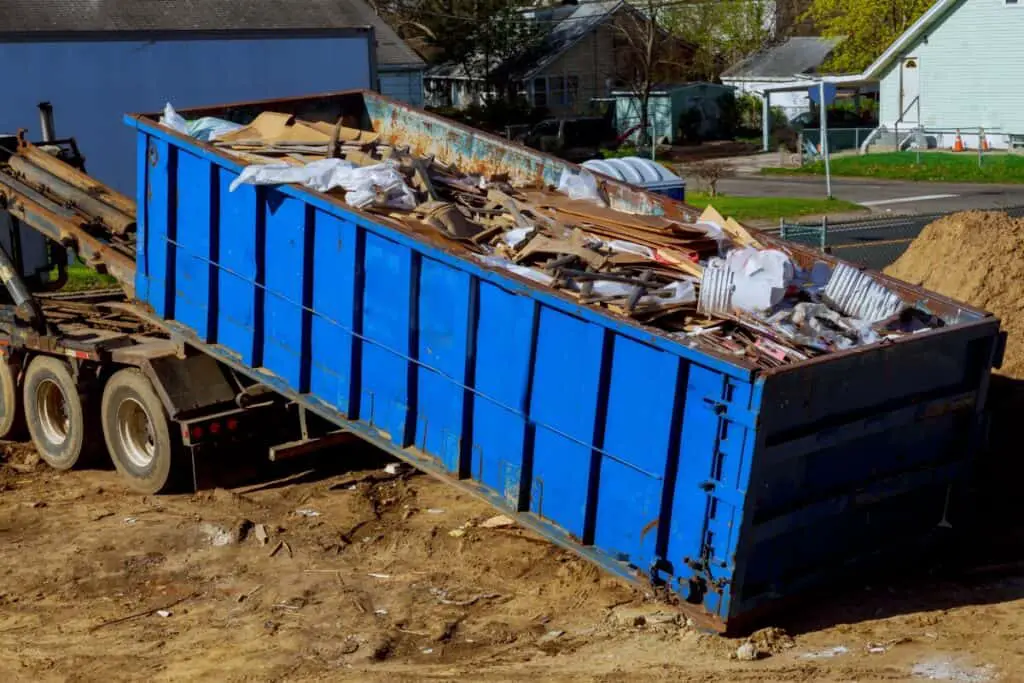
Garbage trucks are one of the more hazardous trucks in the U.S. They weigh tons and park in odd places to collect trash. You may wonder just how much these trucks actually weigh, especially when they are full of trash.
Rear lodger garbage trucks can weigh up to 14,400 lbs and can carry up to 36,000 lbs. Different models of garbage trucks can hold different amounts of weight, from as little as 7,600 lbs when empty to 50,400 lbs when full. Garbage trucks have city limits on how much weight they can carry.
There are many different kinds of garbage trucks, each having its own weight and carry limit. Keep reading to learn more about the various weights of garbage trucks.
Weights of Different Garbage Trucks
The heaviest and most common type of garbage truck is a rear lodger, which means the trash is loaded in the back of the truck. Rear lodger garbage trucks can weigh up to 14,400 lbs and can carry up to 36,000 lbs. All together this truck can weigh up to 50,400 lbs.
A front-loading garbage truck is used for industrial and commercial trash, weighs 15,800 lbs, and can carry up to 22,000 lbs of cargo. That means this kind of garbage truck on full capacity can weigh up to 37,800 lbs.
Sideloading garbage trucks are mostly used in residential areas, can weigh up to 13,600 lbs, and can carry up to 30,000 lbs. Meaning this truck can weigh up to 43,600 lbs. Also, the sideloading garbage trucks can lift up to 1,600 lbs of trash, making this one monster of a garbage truck.
Roll-off garbage trucks weigh up to 7,600 lbs and can carry 20,000 lbs of weight. This means this truck can weigh altogether 27,600 lbs, making it the smallest garbage truck. Yet, it still weighs roughly 14 metric tons when it is completely full. (Source)
City Rules Regarding Garbage Truck Weights

While these trucks have a very high capacity for weight, that does not mean they will ever reach full capacity. The government has come out and made rules in regard to how much weight a vehicle may possess.
The federal government has a rule of no trucks being allowed to hold weight over 80,000 lbs. Of course, none of the garbage trucks above even come close to this level of weight. This is why local laws have come forth to put an even stricter foot down on the weight management of garbage trucks. (Source)
In Illinois, it is illegal for a garbage truck to weigh more than 40,000 pounds. Meaning many of the garbage trucks mentioned above cannot reach full capacity without breaking the law.
These rules help to make the roads a little safer, but still crashing into a vehicle that weighs 40,000 pounds is still going to be a deadly accident, so be aware when driving near one of these massive vehicles.
Weather Impacting Garbage Truck Weight
Garbage truck drivers cannot test and see how much their cargo weighs. Instead, they have to guess based on their experience of how much a certain amount of trash weighs. Yet, these regulation techniques are highly flawed. No two types of trash weigh the same. Also, though, no two weather condition impacts the weight the same.
When there is rain or snow, the trash inside of the garbage trucks will soak up the moisture and will be heavier. This will affect the weight and make it harder for the garbage truck drivers to realize that their vehicle is over the allotted weight limits. (Source)
Water is actually very heavy. A cup of water is half of a pound. With absorption and standing water, a lot of water can be held inside of your trash. Therefore, this can highly impact garbage trucks.
Accidents Involving Heavy Garbage Trucks
Garbage trucks have a high accident rate. Garbage trucks have to stop at random corners to pick up trash cans. They can be anywhere there are trash cans or dumpsters. This leads to unexpected encounters with garbage trucks, which can lead to accidents.
On average there are 1,400 garbage truck accidents a year and around 107 fatalities.
An example of a sad story involving a garbage truck accident was a mother driving home with her young teenage and infant daughters. They were driving on a backroad when they turned a corner and a garbage truck was parked to pick up a load of trash. Not being able to stop in time, the mother ran into the garbage truck at full force, and the collision killed her two little girls.
The mother, who survived this horrendous accident, sued the garbage truck company. The lawyer argued that the garbage truck had a legal right to park on the road. Yet, the mother’s lawyer was able to make the argument that they could have parked on the side of the road. The mother was compensated $2,700,000. Yet, the lives of her children could not be restored. This is why drivers must be so careful when driving around garbage trucks. These vehicles weigh a lot, and your car will not win that fight.
What We Can Do to Lighten Garbage Trucks

The risk of garbage trucks is that there is so much trash in the world. We all help to contribute to the overweight garbage trucks every day. Garbage trucks have to come by our homes every week because of the United States weight management issues.
In the United States of America, the average person throws away 4.4 lbs of trash a day. This means every year we collectively throw away 1,500 lbs of trash a day. The U.S. is the number one contributor to trash in the world. This fact means there are more opportunities for garbage truck accidents in the United States of America than there are in any other country.
We can help limit the opportunities for such accidents by making efforts such as trying to purchase items that do not have as much packaging on them.
We can also drive our own recycling to our nearest recycling center to help cut down on the waste.
Also, if there are any at-home opportunities to reuse and not let your garbage go to waste, try them! It can make a big difference and help keep the streets a little safer.
Related Topics:
If you like the article above, here are some other similar articles you should check out!
How Much Does it Cost to Dump RV Waste? (10 Examples)
